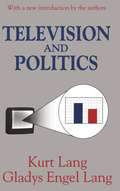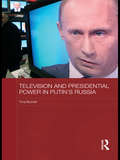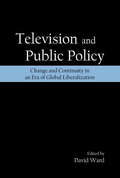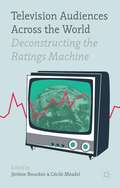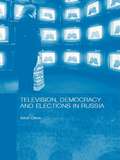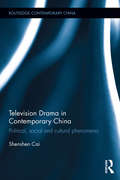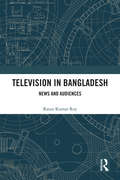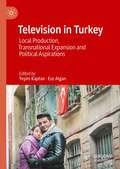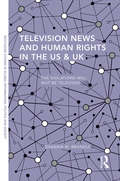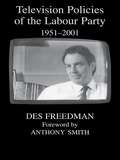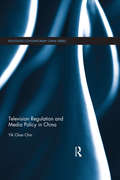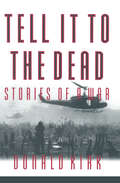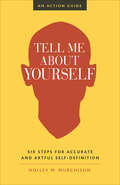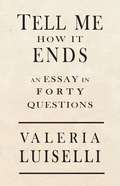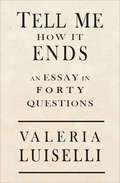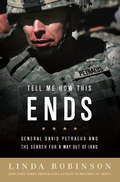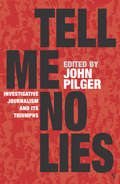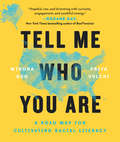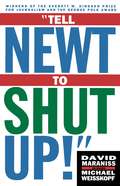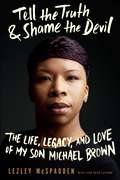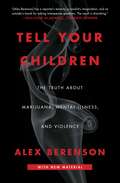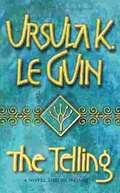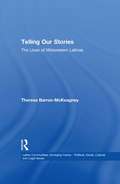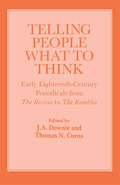- Table View
- List View
Television and Politics
by Kurt Lang Gladys Engel Lang"The authorsahave analyzed the television problem brilliantly. They had come up with a whole set of new insights, and their backup research always is fascinating to read."-Saturday Review"A cautious, research-based bookahopefully it will set a trend."-Ithiel de Sola Pool, Public Opinion QuarterlyAfter more than forty years of studying its political implications, Kurt and Gladys Lang put the power of television into a unique perspective. Through carefully compiled case studies, they reveal surprising truths about TV's effect on American political life, and explode some popular myths. Their theme throughout is that television gives the viewer the illusion of being a favored spectator at some event-he "sees for himself," in other words. But, in fact, it conveys a reality different from that experienced by an eyewitness. Because the televised version of an event reaches more people, it has greater impact on the public memory and comes to overshadow what actually happened.The Langs tell in detail how television shapes events; how public figures and political institutions adjust their tactics to exploit the effects they-and millions of viewers-think television has. They examine such issues as whether or not network television projections influence election results. They consider the accuracy of the networks increasingly sophisticated techniques for "calling" election outcomes well before polls close. Such concerns have never been more at the forefront of the public consciousness than in the wake of the 2000 presidential election. The Langs assess the research to date and clarify the effects of early TV projections on voter turnout and election outcomes, and look at the implications for our system of government.A model of excellent policy analysis, this highly readable volume will interest decision-makers and analysts, as well as students of journalism, broadcasting, political behavior, and voters looking forward to the next election.Kurt Lang was a professor of sociology and political science at Stony Brook before becoming the Director of the School of Communications at the University of Washington. Gladys Engel Lang is a professor of communications with joint appointments in Political Science and Sociology at the University of Washington. In addition to Television and Politics, the Langs have also co-authored The Battle for Public Opinion: the President, the Press and the Polls during Watergate, Voting and Nonvoting, and Collective Dynamics.
Television and Presidential Power in Putin's Russia (BASEES/Routledge Series on Russian and East European Studies)
by Tina BurrettAs a new president takes power in Russia, this book provides an analysis of the changing relationship between control of Russian television media and presidential power during the tenure of President Vladimir Putin. It argues that the conflicts within Russia’s political and economic elites, and President Putin’s attempts to rebuild the Russian state after its fragmentation during the Yeltsin administration, are the most significant causes of changes in Russian media. Tina Burrett demonstrates that President Putin sought to increase state control over television as part of a larger programme aimed at strengthening the power of the state and the position of the presidency at its apex, and that such control over the media was instrumental to the success of the president’s wider systemic changes that have redefined the Russian polity. The book also highlights the ways in which oligarchic media owners in Russia used television for their own political purposes, and that media manipulation was not the exclusive preserve of the Kremlin, but a common pattern of behaviour in elite struggles in the post-Soviet era. Basing its analysis predominately on interviews with key players in the Moscow media and political elites, and on secondary sources drawn from the Russian and Western media, the book examines broad themes that have been the subject of constant media interest, and have relevance beyond the confines of Russian politics.
Television and Public Policy: Change and Continuity in an Era of Global Liberalization
by David WardThe significant changes that have swept the television industry over the last two decades, most notably a shift to deregulation in broadcast media, prompt a discussion on how to ensure that meaningful content is available to the viewer. Television and Public Policy analyzes the current state of television systems in a selected group of countries by exploring the political, economic, and technological factors that have shaped the sector in such a short span of time. Consequently, by positioning the television sector within issues of media policy and the regulatory framework, the book questions what these trends mean for television, and the historical, political, and cultural role in our societies. Television and Public Policy distinguishes itself in several ways:*It is a global project in its comparative scope and subject area. Contributors represent countries including Australia, Brazil, Canada, China, Egypt, India, Iran, Ireland, Israel, Italy, Japan, the Netherlands, New Zealand, Poland, the United Kingdom, and the United States.*It is contemporary and filled with information largely absent in current literature.*It offers original analysis of the contemporary television sector. This book speaks to a broad range of academics, postgraduate, and undergraduate students, and can serve as a key resource for courses ranging from media studies, to development studies, international relations, and law.
Television Audiences Across the World: Deconstructing the Ratings Machine
by Jérôme Bourdon Cécile MéadelThis book is the first to deal with the world composition of television ratings. It focuses on the peoplemeter, a 25 year old technology which succeeds in homogenizing very different populations and television practices. It provides a fascinating account of the production of figures on which the whole world of popular culture depends.
Television, Democracy and Elections in Russia (BASEES/Routledge Series on Russian and East European Studies)
by Sarah OatesSarah Oates gives a detailed examination on a central theme in political science: the relationship between democracy and the mass media. This significant book contains a wealth of information and data, including: public opinion surveys, content analysis of television news, focus groups and in-depth interviews to examine why political parties and the mass media failed so spectacularly to aid in the construction of a democratic system in Russia. The analysis presents compelling evidence that television helped to tune out democracy as it served as a tool for leaders rather than a conduit of information in the service of the electorate or parties. In addition, focus groups and surveys show that the Russian audience are often more comfortable with authority rather than truth in television coverage. Within this framework, this fascinating work presents the colourful history of parties, elections and television during one of the most critical eras in Russian history and captures a particularly significant epoch in contemporary Russian politics.
Television Drama in Contemporary China: Political, social and cultural phenomena (Routledge Contemporary China Series)
by Shenshen CaiDue to high audience numbers and the significant influence upon the opinions and values of viewers, the political leadership in China attributes great importance to the impact of television dramas. Many successful TV serials have served as useful conduits to disseminate official rhetoric and mainstream ideology, and they also offer a rich area of research by providing insight into the changing Chinese political, social and cultural context. This book examines a group of recently released TV drama serials in China which focus upon, and to various degrees represent, topical political, social and cultural phenomena. Some of the selected TV serials reflect the present ideological proclivities of the Chinese government, whilst others mirror social and cultural occurrences or provide coded and thought-provoking messages on China’s socio-economic and political reality. Through in-depth textual analysis of the plots, scenes and characters of these selected TV serials, the book provides timely interpretations of contemporary Chinese society, its political inclinations, social fashions and cultural tendencies. The book also demonstrates how popular media narratives of TV drama serials engage with sensitive civic issues and cultural phenomena of modern-day China, which in turn encourages a broader social imagination and potential for change. Advancing our understanding of contemporary China, this book will appeal to students and scholars of contemporary Chinese culture, society and politics, as well as those with research interests in television studies more generally.
Television in Bangladesh: News and Audiences
by Ratan Kumar RoyThis book examines the role of 24/7 television news channels in Bangladesh. By using a multi-sited ethnography of television news media, it showcases the socio-political undercurrents of media practices and the everydayness of TV news in Bangladesh. It discusses a wide gamut of issues such as news making; localised public sphere; audience reaction and viewing culture; impact of rumours and fake news; socio-political conditions; protest mobilization; newsroom politics and perspectives from the ground. An important intervention in the subject, this book will be useful to scholars and researchers of media studies, journalism and mass communication, anthropology, cultural studies, political sociology, political science, sociology, South Asian studies, as well as television professionals, journalists, civil society activists, and those interested in the study of Bangladesh.
Television in Turkey: Local Production, Transnational Expansion and Political Aspirations
by Yeşim Kaptan Ece AlganThis edited collection takes a timely and comprehensive approach to understanding Turkey’s television, which has become a global growth industry in the last decade, by reconsidering its geopolitics within both national and transnational contexts. The Turkish television industry along with audiences and content are contextualised within the socio-cultural and historical developments of global neoliberalism, transnational flows, the rise of authoritarianism, nationalism, and Islamism. Moving away from Anglo-American perspectives, the book analyzes both local and global processes of television production and consumption while taking into consideration the dynamics distinctive to Turkey, such as ethnic and gender identity politics, media policies and regulations, and rising nationalistic sentiments.
Television News and Human Rights in the US & UK: The Violations Will Not Be Televised (Routledge Studies in Global Information, Politics and Society)
by Shawna M. BrandleDoes the CNN Effect exist? Political communications scholars have debated the influence of television news coverage on international affairs since television news began, especially in relation to the coverage of massive human rights violations. These debates have only intensified in the last 20 years, as new technologies have changed the nature of news and the news cycle. But despite frequent assertion, little research into the CNN Effect, or whether television coverage of human rights violations causes state action, exists. Bridging across the disciplines of human right studies, comparative politics, and communication studies in a way that has not been done, this book looks at television news coverage of human rights in the US and UK to answer the question of whether the CNN Effect actually exists. Examining the human rights content in television news in the US and UK yields insights to what television news producers and policy makers consider to be human rights, and what, if anything, audiences can learn about human rights from watching television news. After reviewing 20 years of footage using three different types of content analyses of American television news broadcasts and two different types of British news broadcasts, and comparing those results with human rights rankings and print news coverage of human rights, Shawns M. Brandle concludes that despite rhetoric from both countries in support of human rights, there is not enough coverage of human rights in either country to argue that television media can spur state action on human rights issues. More simply, the violations will not be televised. A welcome and timely book presenting an important examination of human rights coverage on television news.
Television Policies of the Labour Party 1951-2001: Null (British Politics and Society)
by Des FreedmanDes Freedman explores Labour's divided response to the development of commercial television in the 1950s and assesses the impact of Wilson's governments on television in the 1960s. His key argument is that Labour has always been a vigorous but ultimately unreliable advocate of television.
Television Regulation and Media Policy in China (Routledge Contemporary China Series)
by Yik-Chan ChinSince the late 1990s, there has been a crucial and substantial transformation in China’s television system involving institutional, structural and regulatory changes. Unravelling the implications of these changes is vital for understanding the politics of Chinese media policy-making and regulation, and thus a comprehensive study of this history has never been more essential. This book studies the transformation of the policy and regulation of the Chinese television sector within a national political and economic context from 1996 to the present day. Taking a historical and sociological approach, it engages in the theoretical debates over the nature of the transformation of media in the authoritarian Chinese state; the implications of the ruling party’s political legitimacy and China’s central-local conflicts upon television policy-making and market structure; and the nature of the media modernisation process in a developing country. Its case studies include broadcasting systems in Shanghai and Guangdong, which demonstrate that varied polices and development strategies have been adopted by television stations, reflecting different local circumstances and needs. Arguing that rather than being a homogenous entity, China has demonstrated substantial local diversity and complex interactions between local, national and global media, this book will be of interest to students and scholars of Chinese media, politics and policy, and international communications.
Television Regulation and Media Policy in China (Routledge Contemporary China Series)
by Yik-Chan ChinSince the late 1990s, there has been a crucial and substantial transformation in China’s television system involving institutional, structural and regulatory changes. Unravelling the implications of these changes is vital for understanding the politics of Chinese media policy-making and regulation, and thus a comprehensive study of this history has never been more essential.This book studies the transformation of the policy and regulation of the Chinese television sector within a national political and economic context from 1996 to the present day. Taking a historical and sociological approach, it engages in the theoretical debates over the nature of the transformation of media in the authoritarian Chinese state; the implications of the ruling party’s political legitimacy and China’s central-local conflicts upon television policy-making and market structure; and the nature of the media modernisation process in a developing country. Its case studies include broadcasting systems in Shanghai and Guangdong, which demonstrate that varied polices and development strategies have been adopted by television stations, reflecting different local circumstances and needs. Arguing that rather than being a homogenous entity, China has demonstrated substantial local diversity and complex interactions between local, national and global media, this book will be of interest to students and scholars of Chinese media, politics and policy, and international communications.
Tell it to the Dead: Memories of a War
by Donald KirkThis work reports on the Vietnam war as seen by the GI in the jungles. It discusses current attitudes, views from Saigon, Hanoi and Phnom Penh, and other locales in the countryside.
Tell Me About Yourself: Six Steps for Accurate and Artful Self-Definition
by Holley M MurchisonOwn Your StorySometimes you get only one chance. A good introduction can create connections and open doors. A bad one can make conversation fizzle and opportunities fade. What you need is a story that tells who you are—authentically, compellingly, and concisely—and can be adapted to fit any situation. Created for dynamic beings constantly redefining themselves, their work, and the world around them, Tell Me About Yourself pairs interviews and case studies with a simple, scalable framework, helping you craft and deliver comprehensive, compelling, and generally kick-ass introductions and personal stories for yourself, your team, or your company.In an ever-changing innovation economy and a climate that demands we put our best foot forward to create change, there's no better time to learn how to articulate your usefulness to the world.
Tell Me How It Ends: An Essay In 40 Questions
by Valeria LuiselliA damning confrontation between the American dream and the reality of undocumented children seeking a new life in the US.
Tell Me How It Ends: An Essay in 40 Questions (The Golden Greek)
by Valeria LuiselliAmerican Book Award Winner: A &“moving, intimate&” account of serving as a translator for undocumented children facing deportation (The New York Times Book Review). Nonfiction Finalist for the Kirkus PrizeFinalist for National Book Critics Circle Award for Criticism Structured around the forty questions volunteer worker Valeria Luiselli translates from a court system form and asks undocumented Latin American children facing deportation, Tell Me How It Ends humanizes these young migrants and highlights the contradiction between the idea of America as a fiction for immigrants and the reality of racism and fear—here and back home. &“Luiselli&’s prose is always lush and astute, but this long essay, which borrows its framework from questions on the cold, bureaucratic work sheets with which she became so familiar (for example, &‘Did anything happen on your trip to the U.S. that scared or hurt you?&’), is teeming with urgency…In this slim volume about the spectacular failure of the American Dream, she tells the stories of the unnamed children she&’s encountered and their fears and desires, as well as her own family&’s immigration story.&” —Vulture &“Worthy of inclusion in a great American (and international) canon of writing about migration.&” –Texas Observer &“A powerful indictment of American immigration policy, [Tell Me How It Ends] examines a system that has failed child refugees in particular.&” —Financial Times &“Masterfully blends journalism, auto/biography, and political history into a compelling and cohesive narrative. . . . Luiselli uses the personal to get political but smartly sidesteps identity politics to focus on policy instead.&”—The Rumpus
Tell Me How This Ends: General David Petraeus and the Search for a Way Out of Iraq
by Linda RobinsonAfter a series of disastrous missteps in its conduct of the war, the White House in 2006 appointed General David Petraeus as the Commanding General of the coalition forces. Tell Me How This Ends is an inside account of his attempt to turn around a failing war. Linda Robinson conducted extensive interviews with Petraeus and his subordinate commanders and spent weeks with key U. S. and Iraqi divisions. The result is the only book that ties together military operations in Iraq and the internecine political drama that is at the heart of the civil war. Replete with dramatic battles, behind-doors confrontations, and astute analysis, the book tells the full story of the Iraq War’s endgame, and lays out the options that will be facing the next president when he or she takes office in January 2009.
Tell Me No Lies: Investigative Journalism and its Triumphs
by John PilgerTell Me No Lies is a celebration of the very best investigative journalism, and includes writing by some of the greatest practitioners of the craft: Seymour Hersh on the My Lai massacre; Paul Foot on the Lockerbie cover-up; Wilfred Burchett, the first Westerner to enter Hiroshima following the atomic bombing; Israeli journalist Amira Hass, reporting from the Gaza Strip in the 1990s; Gunter Wallraff, the great German undercover reporter; Jessica Mitford on 'The American Way of Death'; Martha Gelhorn on the liberation of the death camp at Dachau. The book - a selection of articles, broadcasts and books extracts that revealed important and disturbing truths - ranges from across many of the critical events, scandals and struggles of the past fifty years. Along the way it bears witness to epic injustices committed against the peoples of Vietnam, Cambodia, East Timor and Palestine. John Pilger sets each piece of reporting in its context and introduces the collection with a passionate essay arguing that the kind of journalism he celebrates here is being subverted by the very forces that ought to be its enemy. Taken as a whole, the book tells an extraordinary 'secret history' of the modern era. It is also a call to arms to journalists everywhere - before it is too late.
Tell Me Who You Are: Sharing Our Stories of Race, Culture, & Identity
by Winona Guo Priya VulchiAn eye-opening exploration of race in AmericaIn this deeply inspiring book, Winona Guo and Priya Vulchi recount their experiences talking to people from all walks of life about race and identity on a cross-country tour of America. Spurred by the realization that they had nearly completed high school without hearing any substantive discussion about racism in school, the two young women deferred college admission for a year to collect first-person accounts of how racism plays out in this country every day--and often in unexpected ways. In Tell Me Who You Are, Guo and Vulchi reveal the lines that separate us based on race or other perceived differences and how telling our stories--and listening deeply to the stories of others--are the first and most crucial steps we can take towards negating racial inequity in our culture. Featuring interviews with over 150 Americans accompanied by their photographs, this intimate toolkit also offers a deep examination of the seeds of racism and strategies for effecting change.This groundbreaking book will inspire readers to join Guo and Vulchi in imagining an America in which we can fully understand and appreciate who we are.
Tell Newt to Shut Up: Prize-winning Washington Post Journalists Reveal How Reality Gagged the Gingrich Revolution
by Michael Weisskopf David MaranissPRIZEWINNING WASHINGTON POST JOURNALISTS REVEAL HOW REALITY GAGGED THE GINGRICH REVOLUTION Speaker Newt Gingrich and his troops promised a revolution when they seized power in January 1995. The year that followed was one of the most fascinating and tumultuous in modern American history. After stunning early success with the Contract with America, the Republicans began to lose momentum; by year's end Gingrich was isolated and uncertain, and his closest allies were telling him to shut up. Here is an unprecedented, fly-on-the-wall look at the successes, sellouts, and perhaps fatal mistakes of Newt Gingrich's Republican Revolution. Based on the award-winning Washington Post series that documented the Republicans' day-to-day attempts to revolutionize the American government, "Tell Newt to Shut Up!" gets to the heart of the political process.
Tell the Truth & Shame the Devil: The Life, Legacy, and Love of My Son Michael Brown
by Lyah Beth Leflore Lezley McspaddenThe revelatory memoir of Lezley McSpadden--the mother of Michael Brown, the African-American teenager killed by the police officer Darren Wilson in Ferguson, Missouri on August 9, 2014--sheds light on one of the landmark events in recent history. "I wasn't there when Mike Mike was shot. I didn't see him fall or take his last breath, but as his mother, I do know one thing better than anyone, and that's how to tell my son's story, and the journey we shared together as mother and son." --Lezley McSpadden When Michael Orlandus Darrion Brown was born, he was adored and doted on by his aunts, uncles, grandparents, his father, and most of all by his sixteen-year-old mother, who nicknamed him Mike Mike. McSpadden never imagined that her son's name would inspire the resounding chants of protesters in Ferguson, Missouri, and ignite the global conversation about the disparities in the American policing system. In Tell the Truth & Shame the Devil, McSpadden picks up the pieces of the tragedy that shook her life and the country to their core and reveals the unforgettable story of her life, her son, and their truth. Tell the Truth & Shame the Devil is a riveting family memoir about the journey of a young woman, triumphing over insurmountable obstacles, and learning to become a good mother. With brutal honesty, McSpadden brings us inside her experiences being raised by a hardworking, single mother; her pregnancy at age fifteen and the painful subsequent decision to drop out of school to support her son; how she survived domestic abuse; and her unwavering commitment to raising four strong and healthy children, even if it meant doing so on her own. McSpadden writes passionately about the hours, days, and months after her son was shot to death by Officer Darren Wilson, recounting her time on the ground with peaceful protestors, how she was treated by police and city officials, and how she felt in the gut-wrenching moment when the grand jury announced it would not indict the man who had killed her son. After the system failed to deliver justice to Michael Brown, McSpadden and thousands of others across America took it upon themselves to carry on his legacy in the fight against injustice and racism. Tell the Truth & Shame the Devil is a portrait of our time, an urgent call to action, and a moving testament to the undying bond between mothers and sons.
Tell Your Children: The Truth About Marijuana, Mental Illness, and Violence
by Alex BerensonAn eye-opening report from an award-winning author and former New York Times reporter reveals the link between teenage marijuana use and mental illness, and a hidden epidemic of violence caused by the drug—facts the media have ignored as the United States rushes to legalize cannabis.Recreational marijuana is now legal in nine states. Almost all Americans believe the drug should be legal for medical use. Advocates argue cannabis can help everyone from veterans to cancer sufferers. But legalization has been built on myths– that marijuana arrests fill prisons; that most doctors want to use cannabis as medicine; that it can somehow stem the opiate epidemic; that it is not just harmless but beneficial for mental health. In this meticulously reported book, Alex Berenson, a former New York Times reporter, explodes those myths: • Almost no one is in prison for marijuana; • A tiny fraction of doctors write most authorizations for medical marijuana, mostly for people who have already used; • Marijuana use is linked to opiate and cocaine use. Since 2008, the US and Canada have seen soaring marijuana use and an opiate epidemic. Britain has falling marijuana use and no epidemic; • Most of all, THC—the chemical in marijuana responsible for the drug’s high—can cause psychotic episodes. After decades of studies, scientists no longer seriously debate if marijuana causes psychosis. Psychosis brings violence, and cannabis-linked violence is spreading. In the four states that first legalized, murders have risen 25 percent since legalization, even more than the recent national increase. In Uruguay, which allowed retail sales in July 2017, murders have soared this year. Berenson’s reporting ranges from the London institute that is home to the scientists who helped prove the cannabis-psychosis link to the Colorado prison where a man now serves a thirty-year sentence after eating a THC-laced candy bar and killing his wife. He sticks to the facts, and they are devastating. With the US already gripped by one drug epidemic, this book will make readers reconsider if marijuana use is worth the risk.
The Telling
by Ursula K. Le GuinThe long-awaited new novel in the superb Hainish cycle'Le Guin is a writer of phenomenal power' OBSERVER'Her worlds have a magic sheen . . . She moulds them into dimensions we can only just sense. She is unique. She is legend' THE TIMESThere have been eighty requests to send an Observer into the hinterlands of the planet Aka to study the natives. Much to everyone's surprise, the eighty-first request is granted, and Observer Sutty is sent upriver to Okzat-Ozkat, a small city in the foothills of Rangma, to talk to the remnants in hiding of a cult practising a banned religion. On Aka, everything that was written in the old scripts has been destroyed; modern aural literature is all written to Corporation specifications. The Corporation expects Sutty to report back so the non-standardised folk stories and songs can be wiped out and the people 're-educated'. But Sutty herself is in for an education she never imagined.
Telling Our Stories: The Lives of Latina Women (Latino Communities: Emerging Voices - Political, Social, Cultural and Legal Issues)
by Theresa Baron-McKeagneyStereotypes of Mexican American women and the lack of their representation in research literature contribute to misrepresentations of Mexican American culture and their invisibility. In this qualitative study, Mexican American women were interviewed and their life histories were examined using an ethnographic and hermeneutical phenomenological approach.
Telling People What to Think: Early Eighteenth Century Periodicals from the Review to the Rambler
by J. A. Downie Thomas N. CornsThis collection of essays displays a number of different approaches to the most significant early eighteenth-century periodicals. The range is considerable: the critique of ideology and polemical strategy, the political history of the press, the rhetoric of the genre, and the material circumstances of periodical production all find a place. The periodical profoundly shaped the English reading public's ways of perceiving the social and political institutions of their own age.
